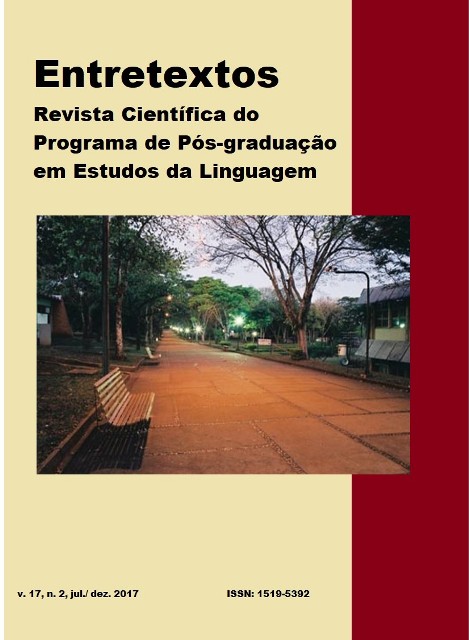The approach to linguistic variation in the English without Borders program: from theory to practice
DOI:
https://doi.org/10.5433/1519-5392.2017v17n2p123Keywords:
Linguistic variation, English as a foreign Language, English without bordersAbstract
English shows variations regarding geographical distribution, situational context and social status. Considering the context of Teaching English as a Foreign Language, this paper aims to investigate the testimonies of how linguistic variation is approached in English language classes in the Brazilian Government program English Without Borders (EwB), at the Federal University of Paraíba (UFPB). It is an exploratory study, which makes use of a semi-structured interview script (MANZINI, 2003), in order to collect the data needed to answer the question that guides this research. We started searching for a concept of language that incorporates the study of linguistic variation, as well as an approach to foreign language teaching that includes the study of such variations among its assumptions. Thus, based on the study of Sociolinguistics and the Communicative Approach, based on researches made by Labov (2008) and Hymes (1972), we emphasize the importance of teaching linguistic variation in the classes. The results show that the teachers of the EwB program have demonstrated to know about linguistic variation and consider it important to teach different variants in the classroom. Moreover, they try to show their students that differences occur in how it is used and that such differences are important to a contextual use of languageDownloads
References
BELINE, Ronald. A variação linguística. In: FIORIN, José Luiz (Org.). Introdução à linguística: objetos teóricos. 6. ed. São Paulo: Contexto, 2012. p. 121-140.
BORTONI-RICARDO, Stella M. Nós cheguemu na escola, e agora? Sociolinguística & educação. São Paulo: Parábola, 2005.
BRASIL. Ministério da Educação. Idiomas Sem Fronteiras. Inglês: curso presencial. Disponível em: http://isf.mec.gov.br/ingles/pt-br/curso-presencial. Acesso em: 6 set. 2015a.
BRASIL. Ministério da Educação. Idiomas Sem Fronteiras. Inglês: teste de nivelamento. Disponível em: http://isf.mec.gov.br/ingles/pt-br/testes-de-nivelamento. Acesso em: 6 set. 2015b.
BRASIL. Ministério da Educação. Portaria n. 1.466, de 18 de dezembro de 2012. Institui o Programa Inglês sem Fronteiras. 2012. Disponível em: http://www.cmconsultoria.com.br/imagens/diretorios/diretorio16/arquivo4359. Acesso em: 6 set. 2015.
BRASIL. Presidência da República. Decreto n. 7.642, de 13 de dezembro de 2011. Institui o Programa Ciências sem Fronteiras. 2011. Disponível em: http://www.planalto.gov.br/ccivil_03/_Ato2011-2014/2011/Decreto/D7642.htm. Acesso em: 6 set. 2015.
BROWN, Douglas. Teaching by principles: an interactive approach to language teaching. 2. ed. White Plains: Longman, 2001.
CHOMSKY, Noam. Conceitos de língua. In: CHOMSKY, Noam.. O conhecimento da Língua: sua natureza, origem e uso. Alfragide: Caminho, 1994. p. 35-65.
FALCÃO, Cristiane Vieira; SILVA, Ewerton Felix. As variantes da Língua Inglesa em sala de aula: uma abordagem didático-pedagógica. In: ENCONTRO DE INICIAÇÃO À DOCÊNCIA DA UEPB, 3., 2013, Campina Grande. Anais... Campina Grande: ENID/UEPB: Realize, 2013. v. 1, n. 1.
FRANÇA, Valéria. Do you speak...? Veja educação, 2001. Disponível em: http://veja.abril.com.br/idade/educacao/140896/p_062.html. Acesso em: 1 jun. 2015.
FRANCESCON, Paula Kracker; SENEFONTE, Fábio Henrique Rosa; BARONAS, Joyce Elaine de Almeida. Variação linguística no ensino de língua inglesa. Revista Entrelinhas, São Leopoldo, v. 7, n. 2, p. 209-221, jul./dez., 2013.
LYONS, John. Linguagem. In: LYONS, John. Linguagem e linguística: uma introdução. Rio de Janeiro: LTC, 1987. p. 1-23.
MANZINI, Eduardo José. Considerações sobre a elaboração de roteiro para entrevista semi-estruturada. In: MARQUEZINE, Maria Cristina; ALMEIDA, Maria Amélia; OMOTE, Sadao (Org.). Colóquios sobre pesquisa em educação especial. Londrina: EDUEL, 2003. p. 11-25.
MULLER, Fernanda Suely. Introdução à história e cultura dos povos de língua inglesa. In: CLAUDINO, Barthyra Cabral Vieira de Andrade (Org.). Inglês: curso de licenciatura em letras-língua inglesa a distância. João Pessoa: Ed. da UFPB, 2014. p. 170-173.
MY ENGLISH ONLINE. Disponível em: http://www.myenglishonline.com.br/. Acesso em: 6 set. 2015.
PULLUM, Geoffrey K. African American vernacular English is not Standard English with mistakes. In: WHEELER, Rebecca. The workings of language: from prescriptions to perspectives. 1999. p. 59-66.
RODRIGUES, Daniel de Sá. O tratamento da variação linguística em livros didáticos de Língua inglesa. 2005. 82f. Dissertação (Mestrado em Linguística Aplicada) - Universidade Estadual do Ceará, Fortaleza.
SAUSSURE, Ferdinand. Curso de linguística geral. Tradução de Antônio Chelini, José Paulo Paes e Izidoro Blikstein. 34. ed. São Paulo: Cultrix, 2012.
SAVIGNON, Sandra J. Communicative language teaching for the twenty-first century. In: CELSE-MURCIA, Marianne (Org.). Teaching English as a second or foreign language. 3. ed. Londres: Heinle & Heinle Thomson Learning, 2001. p. 13-28.
Downloads
Published
How to Cite
Issue
Section
License
Copyright (c) 2017 Entretextos

This work is licensed under a Creative Commons Attribution 4.0 International License.
Entretextos adota a Licença Creative Commons Attribution 4.0 International, portanto, os direitos autorais relativos aos artigos publicados são do/s autor/es.
Sob essa licença é possível: Compartilhar - copiar e redistribuir o material em qualquer suporte ou formato. Adaptar - remixar, transformar, e criar a partir do material, atribuindo o devido crédito e prover um link para a licença e indicar se mudanças foram feitas.























